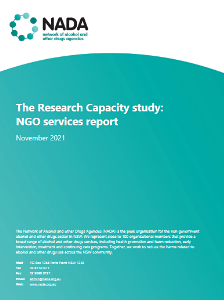Building research capacity across the AOD sector is crucial for maintaining and improving both the quality of care and the outcomes for people accessing treatment and support.
NADA partnered with the NSW Drug and Alcohol Clinical Research and Improvement Network (DACRIN) and the Centre for Alcohol and other Drugs, NSW Ministry of Health, to investigate the research capacity of the AOD service sector in NSW.
Download this report [PDF]
This report focuses on the data collected from non-government services to understand:
- What is the baseline research capacity of staff from non-government services?
- What are the barriers and motivators for conducting research at non-government services?
Overall, non-government AOD staff reported that the sector has a moderate level of research capacity, with organisational capacity deemed slightly higher than that at the team and individual levels.
The two most common motivators for conducting research were to develop skills (63.5%) and researching a problem that needed changing (49.0%). The three most common barriers to conducting research for non-government participants were other work roles taking priority (75.0%), a lack of time for research (61.5%) and a lack of funds for research (47.9%).
NADA will use the report to i) advocate for funding ii) let funders and academics know how better to work with non-government organisations iii) focus on low scoring items and the barriers and enablers to inform sector and workforce initiatives.
Read The Research Capacity Study: NGO services report [PDF]. A paper comparing Local Health District and non-government services will be available shortly.
Evidence check of strategies to build the research capacity of healthcare professionals [PDF], April 2022
The evidence check was undertaken to identify and summarise strategies that could be used to build the research capacity of staff employed by AOD services in NSW.




